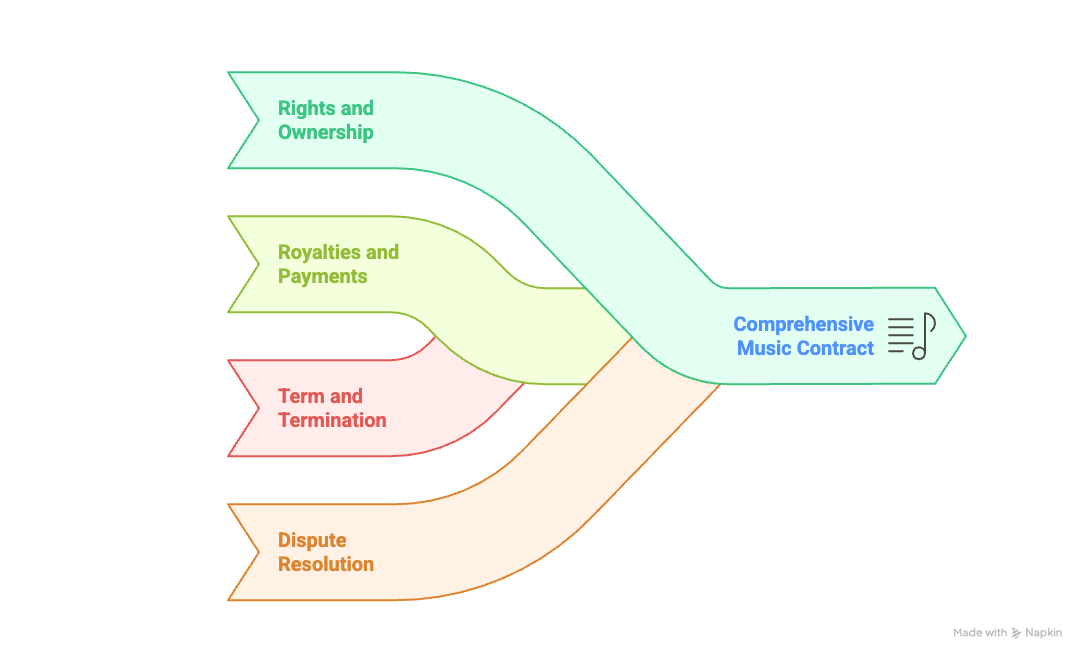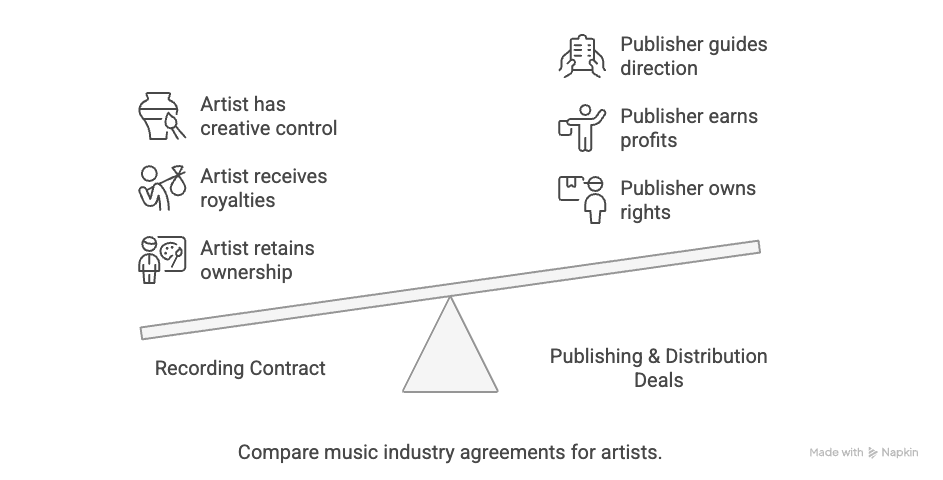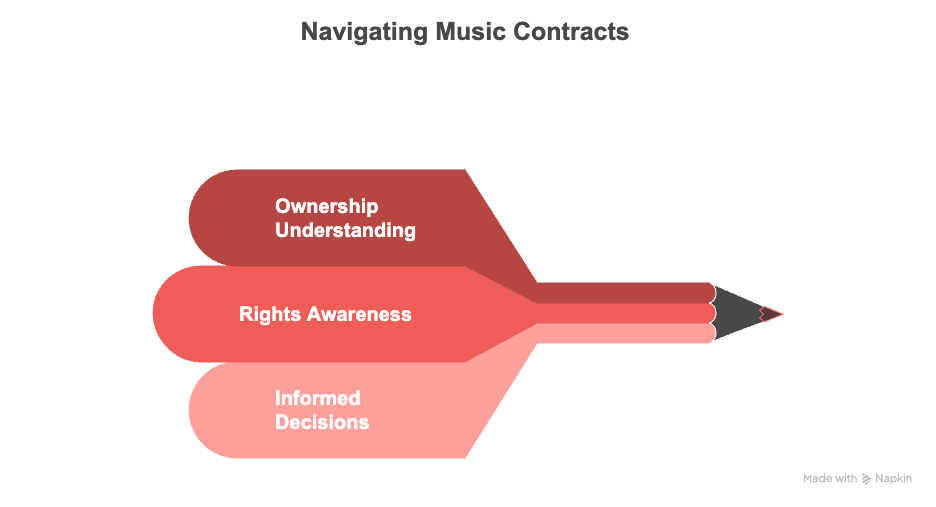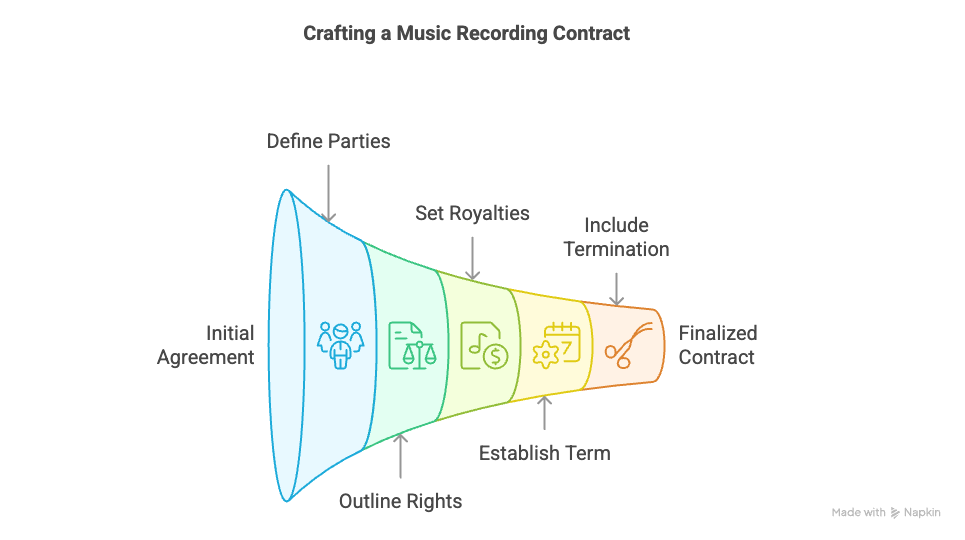
What To Include In A Music Recording Contract: Breakdown
Last Updated on May 11, 2025
A music recording contract isn’t just a formality—it’s your legal and financial foundation for any recording project. Whether you're an independent artist signing your first deal or a label drafting terms for a new release, knowing what to include in a recording contract is crucial.
This post outlines every essential clause you should have, why it matters, and how it protects your rights.
1. Agreement Overview
Start by defining the basics: who the parties are, the date, and the general purpose of the agreement. This section should name the artist, label, or producer involved and outline the intention to collaborate on a specific music project.
2. Recording Commitment & Deliverables
Clarify what is being recorded (single, EP, album), how many tracks are expected, and by what deadline. Include delivery format expectations (e.g., WAV files, stems, mixed/mastered audio).
3. Master Ownership & Rights
Define who owns the master recordings once they’re completed. This clause should also state who can license, sell, or distribute the masters, and under what conditions. Shared ownership? Spell out the percentages.
4. Compensation & Royalties
Explain how the artist or producer will be paid. Will they receive an upfront payment, a royalty share, or both? Clarify gross vs. net revenue, recoupable expenses, and the payment schedule (e.g., quarterly, semi-annually).
5. Term & Termination
How long is the agreement valid? What happens if either party wants out? Include any options to renew, automatic terminations, and what rights survive if the contract ends.
6. Creative Control
Specify who has final say on production decisions, mixing, mastering, and track selection. If co-decisions are required, note the process for resolving creative disagreements.
7. Exclusivity Clause
Indicate whether the artist is exclusive to the label or free to work with others during or after the contract term. This can also include territory limitations or release restrictions.
8. Marketing & Promotion Responsibilities
Who’s responsible for promoting the release? Will the label provide PR or social media support? If so, what’s the scope and timeline?
9. Legal Provisions
This section should include:
- Governing law (e.g., Province of Ontario)
- Dispute resolution method (mediation, arbitration)
- Force majeure (events that release obligations due to uncontrollable circumstances)
10. Signatures & Appendices
Every recording contract must be signed by all parties. If you’re attaching deliverables, schedules, or specific royalty breakdowns, include these as appendices.
Final Thoughts
Without a detailed recording contract, you’re vulnerable to disputes over ownership, royalties, deadlines, and credits. A well-structured agreement helps build trust, protect creative work, and ensure everyone gets paid fairly.
If you’re not sure where to begin, start with a solid template and customize it to fit your project. Always consider a legal review-especially if substantial money or intellectual property is involved.
Download the Free Music Recording Contract Template
Ready to apply what you've learned? Get instant access to the Music Recording Contract PDF - free, editable, and built for Canadian businesses. No sign-up required.
Frequently Asked Questions
Answers to common questions about What To Include In A Music Recording Contract: Breakdown.
What’s the most important clause in a music recording contract?
Master ownership and royalty terms are the most critical, as they affect long-term rights and revenue.
How detailed should deliverables be in the contract?
Very. Specify track counts, delivery format, deadlines, and whether mixing/mastering is included.
Can I adjust royalty splits later?
Yes, but all parties must agree and sign an amendment. Original terms remain binding until then.
Should I list recoupable expenses in the contract?
Absolutely. Clarify which costs (e.g., production, promotion) are deducted before royalties are paid.
How do I protect my creative control as an artist?
Include a clause that outlines final say or shared approval over production decisions.
What happens if the project is delayed or cancelled?
Force majeure and termination clauses protect both parties from liabilities if things fall through.
Is this contract valid if signed online?
Yes. In Canada, digital contracts are legally binding if properly executed.
Can I use one contract for multiple releases?
You can, but it’s cleaner to create a new agreement or appendix per project to avoid confusion.
Should a lawyer review my recording contract?
Yes-especially if there’s significant money, distribution, or long-term ownership involved.
Where can I find a free template to start with?
Right here. Download our free music recording contract template to get started.
Explore More in Creative Digital Contracts
Discover curated templates in Creative Digital Contracts to help your business stay compliant and efficient.


